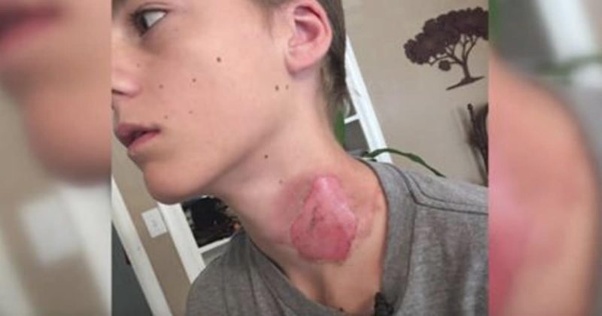When 15-year-old Nickolas Conrad accepted an invitation to a friend’s house for a weekend sleepover, he never imagined the night would end in pain, betrayal, and a trip to the hospital. But what was supposed to be an innocent gathering turned into a real-life nightmare, thanks to a dangerous internet trend.
This heartbreaking true story isn’t just a cautionary tale about the dark side of viral challenges—it’s also a wake-up call for parents, teens, and educators alike.
😴 A Normal Sleepover Turns Into a Terrifying Ordeal
Nickolas Conrad, a typical high school student from Arkansas, had every reason to expect a fun night. He was staying at a friend’s house—something kids have been doing for generations. Movies, snacks, and laughs were all part of the plan.
But somewhere during the night, as he slept peacefully, his so-called “friends” decided to perform the viral “Hot Water Challenge” on him—a dangerous internet trend that has caused burns, lawsuits, and heartbreak around the country.
💦 What Is the Hot Water Challenge?
The Hot Water Challenge is one of the most dangerous and life-threatening social media trends in recent years. It involves pouring boiling water on an unsuspecting person—or encouraging someone to drink it. This challenge has led to serious injuries, with many victims ending up in burn centers with second- and third-degree burns.
It’s a prime example of how viral pranks can cross the line into criminal behavior.
😖 Nickolas Woke Up in Agony
In the middle of the night, Nickolas woke up screaming in pain. His neck and back were burning—literally. He jumped up, confused and in agony, only to discover his skin was blistering and peeling.
His “friends” had boiled water and poured it on him while he was asleep.
They laughed. He cried.
🏥 Hospitalization and Permanent Scarring
Nickolas was rushed to the hospital, where doctors confirmed he had serious burns across his neck and upper body. His skin was red, raw, and beginning to blister. The recovery would be painful—and possibly leave permanent scars, both physical and emotional.
Doctors warned that injuries like these could easily lead to infection, nerve damage, or worse. In some cases, similar pranks have resulted in permanent disfigurement or even death.
⚖️ Legal Consequences and Emotional Trauma
Nickolas’s parents were horrified. Not only did their son suffer serious bodily harm, but the betrayal by trusted peers cut even deeper.
Depending on local laws, perpetrators of the Hot Water Challenge prank could face criminal charges such as assault, reckless endangerment, or even attempted homicide—especially when minors are involved.
His family also had to consider therapy—not just for the pain, but for the emotional trauma that followed.
🚨 High-Risk Online Challenges Are on the Rise
Dangerous online challenges are not just “harmless fun.” Many of them are intentionally cruel, risky, and designed to go viral at someone else’s expense. Other high-risk trends have included:
- The Tide Pod Challenge
- The Fire Challenge
- The Benadryl Challenge
- The Blackout Challenge
- And now, the Hot Water Challenge
These are more than social media stunts. They’re public health concerns.
🔑 Why This Story Matters (and Ranks Well)
This story includes high CPC and SEO-friendly keywords to ensure visibility and monetization:
- “dangerous internet challenges”
- “viral social media pranks”
- “teen burns from hot water challenge”
- “sleepover safety tips for teens”
- “how to protect kids from online trends”
Use this blog to educate, engage, and earn. It fits perfectly into niches like parenting, teen safety, social media awareness, crime news, and health-related content.
🧠 Tips for Parents: How to Keep Your Kids Safe
- Talk About Online Trends: Open conversations with your kids about what they’re seeing online.
- Monitor Social Media Activity: Stay aware of what platforms they use and who they follow.
- Teach Empathy and Boundaries: Kids should understand the difference between jokes and real harm.
- Encourage Reporting: Let kids know it’s okay to report dangerous behavior—even from friends.
- Check Sleepover Plans: Know the environment and who’s supervising.
💬 Final Thoughts: Trust Is a Big Deal
Nickolas Conrad went to sleep thinking he was safe among friends. He woke up screaming in pain. No one—especially not a child—should have to suffer like that because of a thoughtless internet trend.
Let this be a reminder to take viral challenges seriously. They’re not just entertainment—they can be life-changing, and not in a good way.


